#swedish justice system
Text
YR Season 3 speculations: a layperson’s take on the criminal justice side
I’ve been considering making this kind of post for a while, because I’ve seen a lot of hopeful takes on how things are going to play out now that Sara has called the police, and I feel like I could add some perspective for those less familiar with the Swedish justice system. I hesitate to do it because I’m just a layperson and not even from Sweden but the next country over - but our justice systems are reasonably similar, I’ve spent a lot of time poring over relevant sources on Swedish law and justice, and @scatteredpiecesofme encouraged me to do this after our conversation yesterday.
So, here goes, haha.
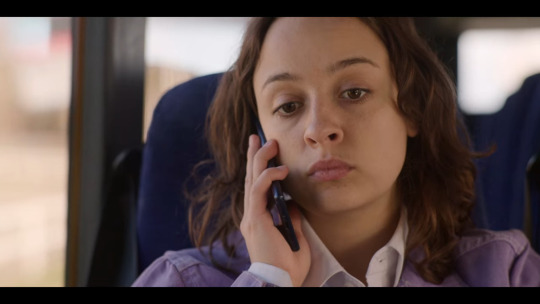
As usual, I could very well be wrong about some things, and I welcome any additions or corrections!
Part 1: The system
Let’s start with a cultural observation: the criminal justice system in Sweden strives to be rehabilitative (restorative) instead of strictly punitive (retributive). This is especially true for young and first-time offenders, who are yet to develop a ‘criminal lifestyle.’ Fines, suspended sentences, and sentences on the lower end of the scale are the norm unless the crime is very serious. (See for example this text in Swedish about how the brain only fully matures at 25 and how young people experience punishments more severely.)
Swedish law recognises three different age brackets for offenders: 15 to 18, 18 to 21, and over 21 (adult). The punishments for young adults were harshened in Jan 2022 for some severe crimes (mostly to counter gang violence), but YR is set in the autumn of 2020 and spring of 2021. With that in mind, let’s review the situation that should apply in the show.
Firstly, the now-outdated law and practice include something known as ungdomsrabatt (juvenile discount). Any sentence given to an 18-year-old is normally reduced to 50% of an adult’s sentence, and a sentence given to a 16-year-old is reduced further so they get about 20-25% of an adult’s sentence. This can either mean a reduced version of the same sentence, or an alternative, more lenient sentence. Punishment can also be waived entirely for juveniles sentenced to minimal fines for minor offences (e.g. minor narcotics offences).
Secondly, there are some punishments specifically designed for young offenders. Ungdomstjänst (youth community service) and ungdomsvård (youth/juvenile care) mostly apply to those under 18 but can also apply to those under 21 where appropriate. The latter is for those in need of social service intervention; it’s an open arrangement where the juvenile continues living at home. Sluten ungdomsvård (institutional youth care) only comes into play in very serious cases. It’s the primary punishment for minors who would otherwise face imprisonment and, under the old law, also for those under 21, unless there are very heavy grounds for prison time.
There is also something called ungdomsövervakning (youth supervision); basically youth care with more restrictions. However, it was only introduced in Jan 2021, which means it cannot be applied to crimes committed earlier (for example in YR S1).
As mentioned, juveniles can also be sentenced to reduced versions of the same punishments as adults. For young adults, that most likely means a suspended sentence and/or community service and/or fines. These fines are often dagsböter (day-fines), which can range from 50 to 1000 kronor based on the defendant’s income, wealth, and debts for example. The minimum number is 30 fines, the maximum is 150, or 200 for several crimes. There can also be some other financial consequences, e.g. a 1000-krona payment to the Crime Victim Fund or compensation for the victim (these are much lower sums than in the US, for example).
Here’s a made-up example from Domarbloggen: three people aged 16, 18 and 22 beat someone up together. The 22-yo gets 4 months’ imprisonment, which means the 18-yo should get 2 months. Instead, she gets a suspended sentence and 75 hours of community service. The 16-yo should get 1 month, but that is commuted to 50 hours of youth community service. Social services are (and must be) involved for the 16 and 18-yo but find that they are not in need of any services.
Thirdly, juveniles are processed differently from adults. If someone younger than 21 is suspected of a crime, the police investigation that starts when the crime comes to light must be conducted without delay. For those under 18, there’s a time limit of 6 weeks from the initial police report to the decision to prosecute. In many cases, the prosecutor can simply decide not to bring charges and hand the matter over to social services instead. (See for example this Q&A document on the old law, in English.)
Young offenders are also often eligible for förundersökningsbegränsning (limitation of preliminary investigation) and åtalsunderlåtelse (no-prosecution deal). In the former, the police and prosecutor decide not to investigate the crime, and in the latter, the suspect confesses their guilt to avoid being charged or tried for that particular crime. There are specific circumstances in which these can come into play - for example, when there are several crimes being investigated/charged and the crime in question would not affect the sentencing, or the sentence would be minor anyway. Here’s more info on the reasoning in Swedish, but it’s basically done to save resources for other crimes. The sentence for all the crimes committed is determined as a whole; it does not necessarily match the sum total of all the individual sentences. Accepting a deal means the crime will still go on the person’s criminal record.
If sufficient evidence is found and the matter does go to trial, the court can decide to hold it behind closed doors if the parties are young and/or to protect them from negative publicity. The judge must also be specialised in juvenile cases if the defendant is under 18.
Trials in this corner of the world are usually rather boring compared to what you see on TV. There’s no jury or heated cross-examination. The facts are presented, the injured party, defendant, and witnesses are heard, and the court considers the case. (Here’s a detailed description and even a 24-minute film in Swedish.)
The bar for detaining young offenders before and after the trial is higher than for adults, but it can happen if they are considered dangerous or there’s a risk of them destroying evidence/influencing the witnesses (for minors, the social services usually watches over them instead). There is no bail system.
Oh, and if someone is sentenced to prison after all, they are not necessarily taken away directly after the trial. Serving the sentence may be postponed until the period of appeal runs out (often 3 months after the sentence enters into force, according to the Prison and Probation Service).
So, now that we know the framework, let’s take a look at the crimes that could come into light in YR S3! Not just those committed by August, but also those committed by Simon and Wilhelm.
Part 2: The crimes committed by the mains in YR
All excerpts quoted are from an English translation of the Swedish Criminal Code. I will include some of my own interpretations in the context of the show - but while reading those, please keep in mind that I’m just a layperson and could well be completely mistaken!
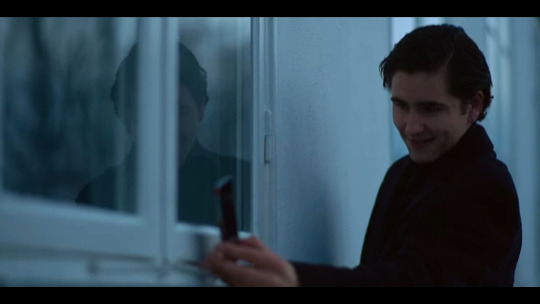
Kränkande fotografering (intrusive photography): August
A person who unlawfully, by means of a technical device, covertly records an image of a person who is indoors in a home, or in a toilet, dressing room or other similar space, is guilty of intrusive photography
(Swedish Criminal Code, Chapter 4, Section 6a)
Scale of punishment for adults: fines or prison up to 2 years.
I don’t think this should be very hard to prove now that Wille has admitted to being on the video. August could of course claim it was someone else using his phone, but I think it should definitely be someone other than Alexander, who had already been caught with the drugs.
Olaga integritetsintrång (unlawful breach of privacy): August
A person who intrudes into the private life of another person by disseminating:
1. an image of or other information about a person’s sexual life;
(...)
4. an image of a person in a very vulnerable situation; or
5. an image of a person’s wholly or partially naked body
is, if the dissemination is liable to result in serious damage to the person whom the image or information concerns, guilty of unlawful breach of privacy
(Swedish Criminal Code, Chapter 4, Section 6c)
Scale of punishment for adults: fines or prison up to 2 years for normal severity, prison from 6 months to 4 years for gross offences.
This is the revenge porn clause. In reality, sadly few cases lead to a conviction; for example in 2021, only 27 out of 1876 cases. The perpetrator can always claim their device/account was hacked, for example, and it’s hard to disprove that. We’ll see if Sara’s testimony and August having admitted his guilt to Wilhelm are enough.
Förtal (defamation): August
A person who identifies someone as being a criminal or as having a reprehensible way of life, or otherwise provides information liable to expose that person to the contempt of others is guilty of defamation
(Swedish Criminal Code, Chapter 5, Section 1)
Scale of punishment for adults: fines for normal severity, fines or prison up to 2 years for gross offences.
Note that defamation does not have to be untrue in Sweden! It’s the ‘exposing that person to contempt’ that matters. However, if the defendant can show that the information was true and they were a) obliged to make this kind of statement or b) it was “otherwise justifiable to provide information about the matter”, they are not held responsible. August’s lawyer would probably argue that spreading the video of Wille was a matter of national importance.
A note on aggravating or special circumstances:
Both unlawful invasion of privacy and defamation can be considered gross if the information or image or the method of dissemination was liable to result in serious damage. This bumps up the potential consequences.
Normally, charges can only be brought for the above crimes by the injured party. However, the prosecutor could also choose to bring charges on their own in cases where public interest calls for it. The same goes for defamation if the injured party is under 18 or reports the crime in connection with another investigation, and public interest calls for prosecution. In this case, it doesn’t matter if the injured party wants the case to be pursued or not. So in my view, any potential resolution where Simon and/or Wille decide not to pursue these crimes should be written very carefully to exclude public prosecution.
There’s also another interesting angle that I haven’t seen thrown around much. It was first brought to my attention by a friend on ao3, and I can’t believe it’s still a thing in 21st century Sweden, but it is.
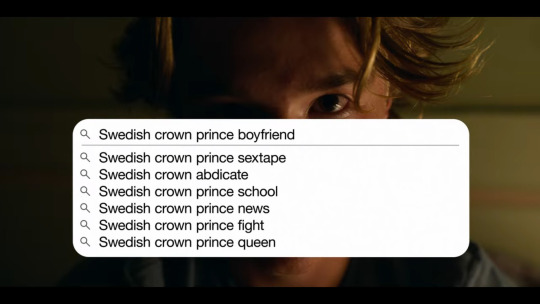
Högmålsbrott (treasonable offences): August
A person who commits an offence referred to in Chapters 3–5 that involves abuse of the King or another member of the Royal House, or of a person discharging the duties of the Head of State as regent, may be sentenced to imprisonment for at most four years if the offence can otherwise result in imprisonment for at most six months, and for at most six years if the offence can otherwise result in imprisonment for more than six months but at most four years.
(Swedish Criminal Code, Chapter 18, Section 2)
Yes, really. Wille being one of the injured parties could complicate things for August when it comes to the above crimes, because they belong to chapters 4 & 5. He’s not actually going to get six years in prison for gross defamation, that’s just the maximum for adults, but it’s an interesting angle and a potential aggravating factor.
Next up, the elephant in the room.
CP: August
I don’t think I need to describe what this means; you can look it up in Chapter 16, Sections 10a and 10b. I’m not going to write it out so this post doesn’t get flagged.
Scale of punishment for adults: fines or prison up to 6 months for minor offences. Prison up to 2 years for normal severity.
Rickard did say that this could land August in prison, but I am highly sceptical. For comparison, consider this case, where an 18-yo who had 540 images in his possession, 98 of those particularly graphic, was only sentenced to 60 hours of youth community service, despite having disseminated some material on social media on two occasions. Or this one, where an 18-yo who was in possession of a video sent to him via SnapChat for a few months, was sentenced to 45 hours of the same - although he was 17 at the time of the crime.
August was 18, but on the other hand, the video he made and disseminated was short, not very graphic, and meant to defame the people in it rather than arouse those who view it. By law, the age and developmental gap between the victim(s) and perpetrator must also be taken into consideration, and as we know, it’s only two years. I’m inclined to think August is only looking at a minor offence - if charges are even brought at all.
So, the fandom should probably prepare for a more lenient sentence than many are hoping for! Ironically enough, the opposite is true for the next crime, which also applies to Simon and, to a lesser degree, Wille.
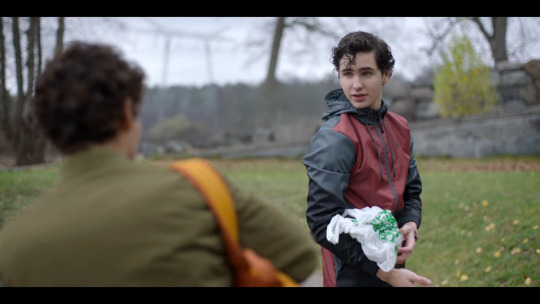
Narkotikabrott (narcotics offence): August, Simon, Wilhelm
Any person who unlawfully
1. transfers narcotics,
2. manufactures narcotics intended for misuse,
3. acquires narcotics for the purpose of transfer,
4. procures, processes, packages, transports, keeps or in some other similar way handles narcotics which are not intended for personal use,
5. offers narcotics for sale, keeps or conveys payment for narcotics, mediates contacts between seller and purchaser or takes any other such measure, if the procedure is designed to promote narcotics traffic, or
6. possesses, uses or otherwise handles narcotics
shall, if he has acted wilfully, be sentenced for a narcotic drug offence
(Penal Law on Narcotics, Section 1)
Scale of punishment for adults: prison up to 3 years for normal severity. Fines or prison up to 6 months for minor offences.
Swedish law is strict on narcotics crimes. Both Simon and August are guilty of several of the above, while Wille is only guilty of use. Wille’s offence would be considered minor, and the punishment might even be waived. However, I think it’s quite likely Simon and August might be looking at normal severity, and Rickard would probably advise August against bringing it up just to spite Simon.
If August went against that advice or the matter came out another way, he would probably get a harsher sentence than Simon on account of his age - although he could provide mitigating circumstances for the selling by saying that Simon coerced him...
In any case, Simon wouldn’t get off with a slap on the wrist either. He sold drugs on two separate occasions - ADHD drugs (which are amphetamine derivatives) and possibly also strong painkillers. Micke’s back pain was specifically mentioned in S1, we saw Simon steal Tramadol (which is an opioid) when he first got pills for August, and there was clearly more in that bag than just the ADHD meds. Amphetamine derivatives and opioids are specifically classified as narcotic drugs due to their potential for misuse, even if the drugs in question (Tramadol and lisdexamfetamine) aren’t as bad as some others.
Furthermore, Simon also committed:
Stöld (theft): Simon
Pretty self-explanatory. Chapter 8, Section 1 of the Criminal Code.
Scale of punishment for adults: fines or prison up to 6 months for minor offences, prison up to 2 years for normal severity, prison from 6 months to 6 years for gross offences.
It’s hard to say what the severity would be. On the one hand, it was just a few boxes and bottles of pills, and the value of the stolen goods should generally be over 1000 kronor to even be considered normal severity (case from 2009). On the other hand, committing theft as part of “criminal activities conducted systematically” is an aggravating circumstance. But I think the prosecutor would be lenient with a 16-yo like Simon and just focus on the narcotics crime (åtalsunderlåtelse for the theft).
Let’s proceed to the last crime, which is something I haven’t really seen a lot of people mention.

Olaga hot (unlawful threat): Wilhelm
A person who threatens another person with a criminal act in a manner that is liable to occasion serious fear in the person threatened for the safety of their own or someone else’s person, property, liberty or peace is guilty of making an unlawful threat
(Swedish Criminal Code, Chapter 4, Section 5)
Scale of punishment for adults: prison from 9 months to 4 years for gross offences. Fines or prison up to 1 year for normal severity.
It’s highly unlikely that Wille’s shotgun waving would come out unless someone accidentally let it slip when questioned about the other offences. So the risk is slim, but I think it still deserves to be included, because an unlawful threat usually becomes a gross offence when a weapon is used. It’s also a publically prosecutable offence, which means August wouldn’t have the power to drop the charges. Note that the ‘treasonable offences’ clause doesn’t apply, because August has not officially been appointed as next in line by Parliament.
Like I said, I don’t think there’s any reason for August to sour his relationship with the Crown by dropping Wilhelm in it. I just wanted to include the threat to be thorough and show how much of a mess this could theoretically become.
Phew, that’s all of them! Thank you so much for reading all this way!
I guess the main point I wanted to make with this marathon post was that I really, really hope the criminal justice side is handled realistically in S3 now that a police investigation probably can’t be avoided. We shouldn’t expect anyone to be locked up with the key thrown away, due to the young age of everyone involved and the leniency built into the system. Also, the severest consequences could well come from the crimes that don’t sound as serious on the surface, such as the drug stuff - and Wille being one of the injured parties. (Or the potentially gross unlawful threat, but I doubt that’s going to come out.)
I’m intrigued to see what Lisa and co have in store for us, because they have a very real chance to highlight some interesting questions here.
Which (if any) of the potential crimes will August, who can liquidate enough money to pay for a great legal team, actually get punished for? Will he get off with fines and maybe some youth community service? Will the Alexander defence actually work when it really shouldn’t? Will social services get involved and maybe make August get some help for his issues? How will his social standing be affected when people learn it was him behind the video? Will the consequences finally teach him some accountability (which he definitely hasn’t learned growing up; see my analysis post about his upbringing and background)?
How about Simon? Can he avoid getting harshly punished for his dealing? How will social services treat him and his family if they get involved? Will his future and education be affected? Will he feel victimised again when the video matter is investigated (which could involve more publicity due to Wille’s involvement)? Could Micke try to claim he forced Simon to carry the drugs and sell them, to provide mitigating circumstances (and would Simon let his estranged dad risk imprisonment for him)?
And finally, is it fair that Wille being one of the injured parties could make the crimes more severe and extract “more justice”? Even though Simon was the one who couldn’t just deny being on the video to escape the negative consequences?
We shall see.
#young royals#young royals season three#young royals season 3#yr s3#young royals season 3 predictions#young royals predictions#young royals speculations#young royals analysis#young royals meta#criminal justice in sweden#swedish justice system#swedish law
211 notes
·
View notes
Text
Just some random late night thoughts. A bit angsty too, though.
Pairing: Gaspard and Xavier
Word count: 1089
“I miss you so much, darling.” Xavier whispered into the air of his empty apartment, the words soft and vulnerable, without the response that Xavier so desperately craved. After all, he wasn’t on the phone with anyone, neither calling nor video chatting. He was alone at his place and he was in fucking Sweden.
With a deep sigh, Xavier grabbed his cup of hot tea and sat down in his spacious living room, only the silence answering his hushed words. He looked down at his phone on the table, his searching gaze hoping to see a coming notification from one certain person. But deep inside he knew it was just pointless. In the end, the one he wanted to contact him the most remained almost silent and would probably do so for a long time to come… And I deserve it, don’t I?
Xavier took a sip of the hot tea and slowly rubbed the bridge of his nose, his annoying hangover, the result of the previous night, only adding to his guilt and regret that took over his body, making him even more anxious. Yeah, he fucking derserved it indeed. After all, he was just one fucking idiot to decide that it was better to leave his partner, his bandmate, his love, all alone back in Paris, just because he wanted to flee fucking covid restrictions.
Sure, at first Xavier was quite angry and full of pride. After all, he’d owned this Swedish apartment for a long while and he’d mentioned the possibility of escaping here quite a few times. He’d always liked Stockholm and had visited it many times with Gaspard, so when it turned out that there were almost no pandemic restrictions in Sweden, it was obvious that he’d prefer to escape here, and obviously with Gaspard too. But Gaspard had said no.
They’d argued about some trivial shit and Gaspard had firmly stated that he felt good in Paris, even with its rigorous restrictions. It was their city, he had everything he needed there, and there was no way he was going to leave for Sweden, especially when he was working on his solo stuff. Of course, Xavier, as stubborn and controlling as he could be, hadn’t listened and had given Gaspard a dumb ultimatum. “Oh, really? Well, I guess I’ll fucking go just alone! Watch me”, thinking that maybe Gaspard would agree then, but he still didn't. So Xavier really did escape. After all, his pride wouldn’t have let him retreat back now...
And that’s how he ended up alone in Stockholm, soon unpacking his things with a stubborn spite, but his heart not being in it anymore. The same heart that felt as cold as the Scandinavian morning when Gaspard sent him only a short text message to know if he had arrived safely. Xavier just swallowed hard, his fingers almost itching to call his partner, so eager, already so desperate to hear his lovely, soothing, deliciously soft voice. But no, pride was still greater and he only replied with another few words message instead of just calling him, which is what they would do under normal circumstances. Ouch, that fucking stung, huh?
But fuck pride. Now, after days of trying to convince himself that he was living such a great, free life by going to bars and getting drunk all by himself, he finally stopped fooling himself and accepted that he’d made a fucking mistake. After all, what was fun in all of it when his true love was fucking thousands kilometers away, so far away from his touch, sight and voice?
It hadn’t even been a week and he already missed him. Xavier so unbearably missed Gaspard, his bandmate, his best friend, his love, the one who knew all of his secrets and the one that he always goofed around with. The one he wanted to wake up next to every morning and talk to every day. He was Xavier’s day and night. His sun and moon. His hope and smile. And he just missed him and his silly doodles and pure excitement when he talked about yet another obscure song or a comic. He missed the softness of the curls under his fingertips and the comforting touch of his big hand holding his middle. The shared warmth under the covers and the cuddles on the couch in the middle of the day, and so, so, so much more that he could take long hours to talk about.
Xavier simply missed Gaspard and all of that he brought into his life, which was unspeakably a lot.
Still, the rational part of his mind knew that some break would do good for them too. After all, everyone needed the room for the individual and it’d allow them to think more about themselves as those individuals indeed, while addressing the things that really differed them as well. Solitude forces one to introspect and discover one’s own personality in plenty of ways and everyone needs those once in a while to be truly in touch with their own self… But to embark on a journey of self-discovery, you usually need to be somewhat at peace with yourself, and Xavier needed to talk to Gaspard first in order to be just that.
Suddenly, Xavier put down the cup and grabbed his phone to make a quick call to Gaspard before he could even think about it and cowardly back out. He waited a moment or two until he just closed his eyes in relief and comfort as the soft voice answered a simple; “Xavier.”
His heart sped up and a warm cloud seemed to embrace him as dozens of possible matters, simple ones and not so simple, came to his mind that he wanted to share with his love. However, all of it could wait because, first, he needed to voice the most important. The words that he was never tired of voicing.
“First of all, I just wanted to tell you that I love you.” Xavier murmured with a voice that seemed to contain regret, guilt, but also his devotion and clear affection and love. And then, he slowly just laid down on his couch while getting lost in the sound of his reciprocating, forgiving lover, as even bigger relief and warmth spread across his body. In the end, maybe he was far away from Gaspard, which still sucked and they had a lot to discuss, but as long as he was able to share his affection, his love… Things were really far from bad.
#this is really just some unedited babbling#but i guess this is what my tumblr is just for sorry#the swedish angst been in my mind for a long while and it probably deserves a much better and more organized take but like yeah#just late night thoughts and needed to get some things out of the system i guess#justice#justice band#justice slash#my fanfiction#fanfic#writing#my writing
13 notes
·
View notes
Text
Subtext and Culture, Young Royals, Season 3, Episode 1
Season 3 picks up a short while after the jubilee speech by Wilhelm. Both Wilhelm and Sara have been absent from school for a noticeable amount of time, so maybe a week or two later? The show isn't very diligent in ensuring a perfect timeline, but this would put us in early March perhaps? Anyway, we're off to the castle for a meeting to deal with the fallout of Wilhelm's speech and Sara reporting the video to the police.
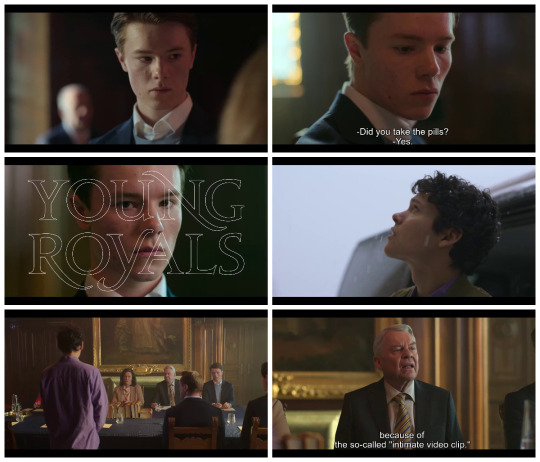
Subtext: The Queen is so pissed she's not even looking at her son, a reversal from the opening to season 2, when Wilhelm was pretty pissed at his mom.
Subtext: This is probably the first time that Wilhelm gets a hint that the Queen is seriously ill.
Cinematography: Same procedure as last season! Every season opens with a fourth wall break where Wilhelm stares in to the camera during the opening titles, defiant as ever.
Culture: For practical reasons the end of season 2 was filmed in April 2022, while the beginning of season 3 was filmed in February 2023. That said, the spring in Sweden can be pretty fickle, and it's not uncommon to have surprise snowfall as late as April. If you want a cinematographic interpretation of this scene, it's supposed to show how cold and unwelcome Simon feels arriving at the royal palace.
Cinematography: In reality, the monarch would be the last one entering a meeting after everyone else has arrived, but having Simon arrive like this makes it look more like he's entering a court of justice or some kind of disciplinary meeting. It's of course not a coincidence that the royal family represented by Jan-Olof is all on one side of the table, while everyone who has been causing them problems is on the other side.
Subtext: Jan-Olof is trying to minimize the video, by using "so-called", and by calling it an intimate video and not a porn video. However, for something to fall under the definition of "revenge porn", it's enough to depict people in an intimate situation, it doesn't have to meet the much higher threshold for when it's considered actual pornography, so he's at least admitting that it was an illegal video.
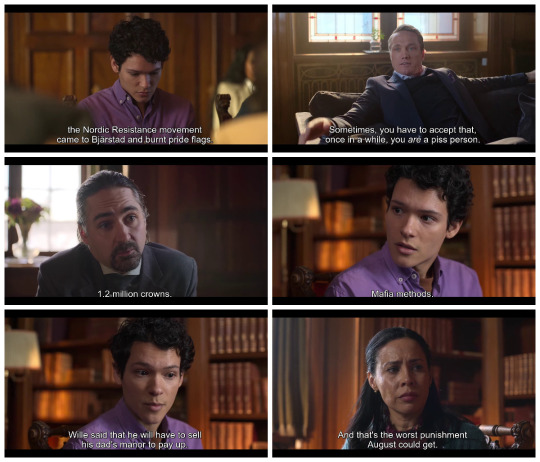
Culture: Nordiska Motståndsrörelsen is unfortunately a real organization of actual neo-nazi white supremacists in Sweden, with offshoots in neighbouring countries.
Lost in translation: The subtitles are struggling here, it's "piss person" in one, and "shitty person" in the other. The former is literally what they're saying in Swedish, but the latter is probably the better expression in English.
Also, we've been told that August's stepdad, Rickard, is one of Sweden's best lawyers. What that means is that he is probably a well-known criminal defence lawyer, and has probably been handling the defence in high-profile cases, and if you're defending obviously guilty criminals, you tend to get a lot of shit from the media and people in general, even though what you're doing is necessary for a fair justice system. This sounds like his way of dealing with that.
Culture: It's a pet peeve of mine that no-one seems to know that the name of the Swedish currency in English is kronor, not crowns. Simon is getting 1.2 million kronor, which amounts to about 105,000€ or $115,000.
Subtext: Linda isn't wrong, they're being strong-armed here. They have some sort of legal counsel, and they wouldn't have to pay any trial costs even if they don't win, but they can't afford to match the resources that August's stepdad can bring, and might get nothing in the end.
Culture: We don't know what Årnäs looks like or how large the estate is, but a quick check shows that you can buy a typical manor house and some farmland in Sweden for tens of millions of kronor. However, the amount of land that some of the other guys were boasting about at the Society party in season 1 would be worth several hundreds of millions of kronor, so it's unlikely that Årnäs is as large as that, because August would have a lot more options if his total net worth was in that ballpark.
Culture: Realistically, Simon isn't wrong. Even if August was convicted on all points, he wouldn't be sentenced harshly because of his age, because he's a first-time offender, and because it's a non-violent crime. He would most likely just be fined a large amount of money and ordered to pay damages, so settling isn't that bad.
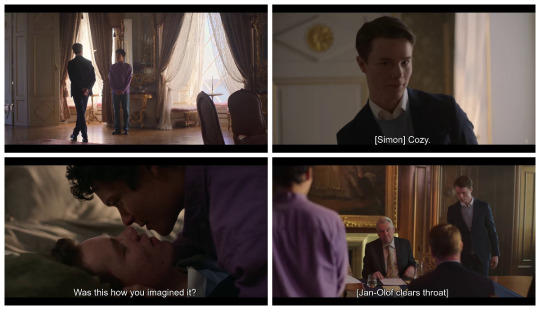
Cinematography: The low winter sun creates some lovely golden light, so we know we're in for some sweet love between the boys. Another detail is the difference in how they're dressed and how they're carrying themselves. Wilhelm is tall and proud, he's at home, he's in a suit, he's sure of himself, while Simon is the guest, the intruder, and is almost shrinking away in his oversized purple shirt and jeans. Yes, yes, colour theory, I know.
Subtext: A nice little flashback to season 1 when Wilhelm said the same thing when he visited Simon's place.
Lost in translation: Simon is actually saying "Var det såhär i din dröm?" - "Was it like this in your dream?", which is a reference to the rather steamy dream Wilhelm had at the start of season 2, when he was lying in this exact bed.
Subtext: Absolutely no-one is fooled, everyone knows our two idiot boys were sucking each other's face a minute ago.
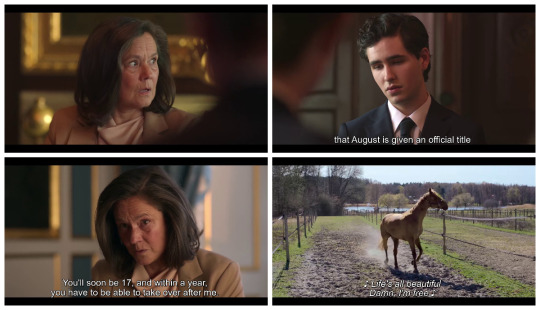
Subtext: Both Linda and the Queen are hearing about their sons' awful behaviour for the first time at this meeting. Linda had no idea Simon had been dealing drugs, and Kristina had no idea Wilhelm threatened August with a gun.
Culture: I have no idea here. There's no real-world example for this in Sweden, you can't put someone into the line of succession by giving them a title. The show is just hand-waving this. Alright. Ok. Fine.
Culture: All adults in the line of succession can be called upon to be acting Head of State, if the monarch is indisposed or on vacation or something. This means that once Wilhelm is 18, he would occasionally have to step in and do the job, even though he's not king yet. If there are no royals available for this, the duty falls to the speaker of the house, Riksdagens Talman.
Cinematography: We're returning to Hillerska after the episode intro at the royal palace, so we're treated to a little montage of what those gosh darn rich kids have been up to in the meanwhile, so here's a horse to remind us that some of them are still riding! This is the only horse we'll be seeing this season, because the show really isn't about Rousseau after all.
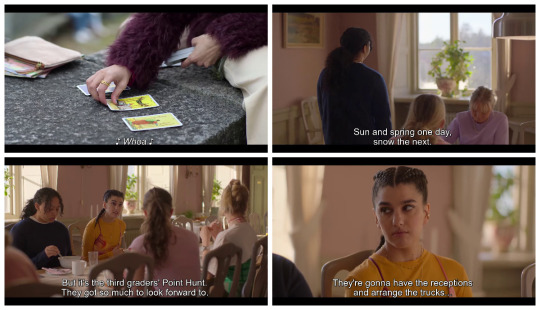
Subtext: Madison is doing Tarot, and she's got Three of Wands reversed and Four of Wands reversed. The first one represents obstacles and lack of progress, and the second one represents home conflict, instability, and lack of support. A bit on the nose, don't you think?
Subtext: It's true, but the show is also calling out itself for the somewhat inconsistent weather we've been seeing due to actual shooting schedules.
Culture: Graduating gymnasiet in Sweden has a bunch of elements that are the same pretty much across the country, and then there are regional differences and individual school differences. I recognize only a few of the things Fredrika rattles off, but it makes sense that a place like Hillerska has a ton of traditions.
Subtext: All the girls have noticed that Felice isn't doing too great, but Madison appears to be the only one that actually cares. Fredrika still hasn't stopped talking about all the crap the third-years are gonna do, because that's apparently more exciting. However, the trucks she's talking about are pretty common, this is what we in Sweden call a Studentflak.
@hanna-kin wrote a long post on Swedish graduation traditions, and I reblogged and added some stuff here: https://www.tumblr.com/skamenglishsubs/684659770007961600/its-that-time-of-the-year-again-and-if-season-2
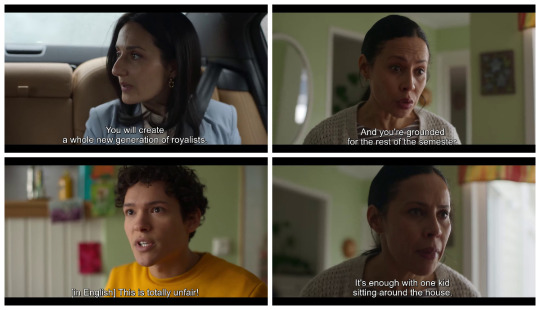
Culture: It seems Minou isn't the head of PR for the royal court anymore, this is Farima, and we've actually seen her all the way back in season 1 when she was instructing Wilhelm to smile more in the photographs. Either way, it seems like she's got a promotion, and she's probably not wrong in her assessment. A bunch of old farts would balk at the idea of the monarch being in a same-sex relationship, but a lot of others would see it is proof that the monarchy can change with the times. There were quite a lot of fans in Team Monarchy after all. 👑🌈
Lost in translation: Linda actually says "Du har utegångsförbud", which means curfew. Grounding kids isn't really a thing in Sweden, to us it's some kind of weird thing that only happens in American teen shows, along with detention. What the fuck even is that?
Subtext: Unlike in season 1, Simon now consistently speaks Swedish at home to his mom, further showing us how distant he is from her, and from himself to some extent.
Lost in translation: Linda actually calls Sara a "hemmasittare", which is a Swedish term used for kids who simply refuse to attend school, typically for mental health reasons. What to do about the problem is a hotly debated political issue, and let's leave it at that.
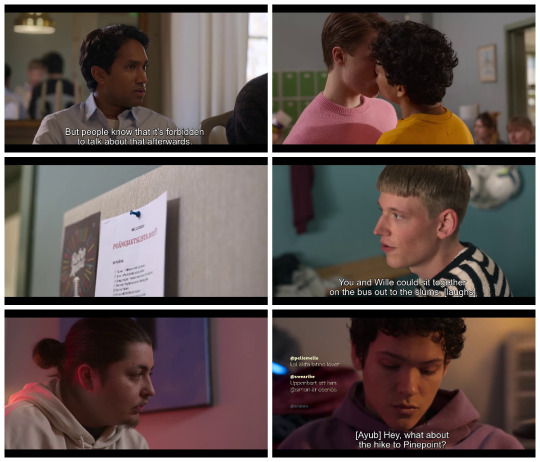
Subtext: This is how the culture of secrecy and solidarity against outsiders work at schools like this. Everyone is abused, everyone participates in abusing younger students, and everyone is told to shut up about it. Every house guards their "secret" initiations to outsiders, to foster loyalty to each other, to your house, and to the school. It's cult behaviour 101.
Cinematography: The show does it's usual trick with the sound design where all outside noise disappears as Simon and Wilhelm retreat into their little bubble, but there are still people in the frame this time, even though we can't hear them, because this time they're snogging in public. Oh, and everyone needs to update their colour theory, new colours dropped, pink and orange, what does it all mean??!?
Blink and you miss it: The list of activities for the point hunt includes:
Tattoo "Hillerska 4-life" on your arm.
Take a selfie at the back of a police car.
Give someone a buzz cut.
Dance the balloon dance in public.
Sext a teacher.
Get a piercing somewhere.
Blink and you miss it: I love Vincent so much, he's just the worst. Oh, and it looks like he's wearing a $2000 Valentino sweater, but I'm not 100% certain.
Subtext: Neither Ayub nor Rosh agrees with Simon when he says he's gonna reply to idiots online, but unfortunately they're not telling him off, because that would lead to less drama in the season.
Blink and you miss it: Ayub and Rosh are talking about going on a hike to Talludden with their school, Marieberg, which is why we're gonna encounter them out in the woods in the next episode. Spoiler alert!
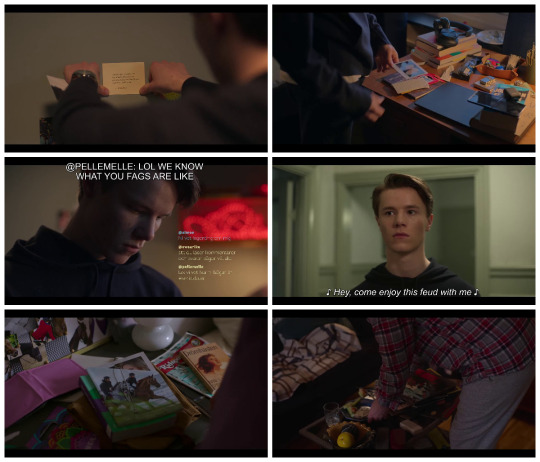
Subtext: Wilhelm puts up the first stanza of a poem by Karin Boye called The Shield Maiden. In English, the poem goes:
I dreamed about swords last night.
I dreamed about battle last night.
I dreamed I fought by your side
armoured and strong, last night.
Blink and you miss it: Wilhelm's desk has a ton of stuff, but he's also kept the broken frog prince snowglobe, and he's still got Erik's lighter and cigarette case from season 2.
Lost in translation: The comment in Swedish uses the word "bögar", which isn't quite as offensive as "fags". However, it's more offensive than "gays", so I understand why the subtitles went with this choice. It's one of those words that is offensive or not depending on context, and it's certainly offensive in this one.
Subtext: The soundtrack is on point as usual, highlighting the animosity between Wilhelm and August.
Blink and you miss it: Someone ordered a Horse Girl Desk™ from the props department, and they sure delivered all the horsey things! The book is the Swedish edition of Not on a White Horse by Nancy Springer:
From the day twelve-year-old Rhiannon spots a lost white Arabian gelding in the woods near her small Pennsylvania mining town, her life finds a focus as she learns to deal with family problems and decides the direction her life will take.
As you do.
Subtext: As a throwback to season 1, this time it's Sara's turn to make a surprise visit at their dad's. He is surprised and starts cleaning up his place, but he seems to be in better shape than when Simon originally turned up. His place is just messy, there are no signs of drinking and smoking unlike last time we saw him.
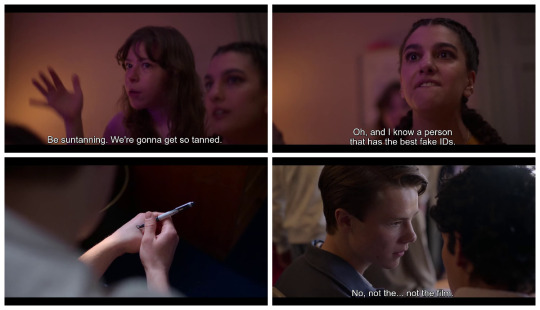
Culture: Who goes to New York to suntan? No-one sane, but sun-starved Scandinavians get a bit of cabin fever after a long dark winter.
Culture: Fake IDs aren't really a thing in Sweden, you're allowed to legally drink at 18, and underage kids are much more likely to have an older friend or sibling or alcoholic parent buy them some booze for a private party instead. Sure, they exist, but equipping your friend group with a bunch of fake IDs to go clubbing is not how it's done.
Subtext: Simon drew a heart on Wilhelm's hand and suggested he get that as a tattoo. Wilhelm objected because he's "not allowed to" as a royal, but here he is, redrawing it on himself, almost as if he's toying with the thought, defying the rules.
Subtext: Simon doesn't know anything about the initiations since he's a lowly external student, and even though they're boyfriends, Wilhelm automatically tries to play it down. He knows it's true though, he doesn't question that, he just doesn't want Simon to know about it because it's humiliating to talk about it.
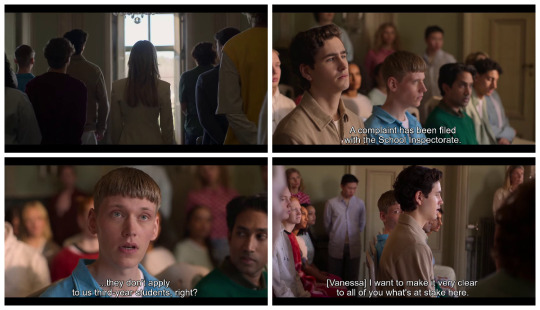
Cinematography: A++ Main Villain Entry Walk.
Culture: The Swedish Schools Inspectorate is a very real government agency that has the very real power to shut down schools that are mismanaged in any way, either academically, or socially.
Culture: Just a quick reminder that every single third-year student is 18 or 19 years old at this point in time, and therefore they are legal adults, which means the school has less authority over them. However, since it's a boarding school, they can enact and enforce regulations for boarders, and kick them out from their houses if they disobey the rules, which effectively kicks them out of the school while technically not doing that.
Cinematography: I love the camera angle here where we just about see Vincent giving Wilhelm the evil eye for indirectly causing this.
As a closing note, this season felt a lot less subtexty to me, compared to previous seasons. On the other hand, a recurring theme now is the airing of secrets, of exposing the systems that create toxic environments like this, so in line with the theme, a lot of characters are voicing things that were left unsaid in previous seasons.
314 notes
·
View notes
Text
I think I’ll say this once, since I need to say it before I can move on to more excited posting about promos and things:
Obviously Young Royals means a lot to me. It’s become another way for me to connect with my hyphenated-American heritage and to start teaching myself Swedish again. It helped me survive a pretty brutal year of bullying at work. It made me confident enough to start the process of getting formally evaluated for autism and ADHD. I’ve been writing a 200k+ historical AU fanfic for YR—the kind of fic I always read and adored back in fandoms when I was younger, the kind of fic I wanted to write myself. I’m proud of the way that Heart and Homeland has made me a better writer, and I’m glad for the way it’s deepened my friendship with @heliza24. It is Young Royals in part that inspired by thesis on restorative justice in YA literature. When I was in the hospital last fall because I almost had a literal stroke from stress, I was comforted and kept calm by the fact that I was wearing a YR t-shirt and had a plush doll of a YR character sitting in my lap. And all of that is the short list.
As we come close to the release date, I hope that every single member of the fandom gets something they enjoy in the new season. I don’t think every person is going to get everything they want, but I genuinely hope there’s a moment, a scene, a line that brings them joy. We’ve all stuck with this series for a while, and I want us all to have something we can take with us. A little bit of sparkle for the road, if you will.
There’s of course the possibility that some of us get a lot of what we want, and others of us are let down. I know this was the case for season 2, and it feels naive to imagine that everyone in the fandom will be equally satisfied by season 3. I’ve got my fingers crossed that I’ll enjoy the hell out of it, but I’m also trying to prepare my heart in case it’s not what I wanted. I’m trying to gently talk to myself right now and say that even if the third season leaves me upset and unsatisfied—even if the writing takes a nosedive or it’s good writing but it’s just not what I wanted—that I still learned a lot about crafting stories and being myself and surviving hardship and thinking about systems and whatever else, from this show. That my experience with the first two seasons still matters, that my work on my fic is something to be proud of. If season 3 is a disappointment, Heart and Homeland will be my new canon. I’m sure there are other people out there talking themselves up in this way too. I know we’re all pushing through the pre-season jitters.
The other thing I’m trying to reconcile right now is how I feel about the promotional material that’s come out, and the conversations around that. Like on my own, I actually feel pretty great? It’s fun to see the new stuff come in? But then I think about the ratio of Wilmon to other things and some of the responses I’m seeing to that. And I see people say like “oh the show is back to focusing on what’s actually good about it” and “it’s great that they’re doing this because the audience doesn’t really care about characters who aren’t Wilmon.” And… hello? Aren’t I the audience? Tumblr isn’t too bad (most of the time) but then there’s like, Instagram, where the Netflix Nordic posted whole set of photos of different pairs and friendships from a whole bunch of shows, and there was one (1) picture of Sara and Rousseau and I saw enough comments where people were like “ew! Vomit! Give us Wilmon instead!” that like… y’all. Frida Argento is a human being and a damn good actress, and Lisa is a good writer of female characters, and like. We can celebrate that, once in a while. We can create space for her too. It’s not Frida OR Omar and Edvin. It’s Frida AND Omar AND Edvin AND Nikita AND Malte AND Nathalie AND Mimmi AND Fabian AND Samuel AND… look I could keep on listing but I’m going to get distracted if I do.
Like, man. I love Wilmon. Don’t get me wrong. I love the complexity their relationship can run with. There are lines heliza has written for them in fic that make me swoon and I am giddy about the part where I get to read them first. I love the glowsticks. I love Wilmon’s sense of humor and the part where they cheated at Vincent’s rowing race thing and their utmost commitment to being dumbass teenage boys against the world. The first week I saw the show and came into work (where we have an athletic field) I went and took a selfie on the field after covering my hands in those gross fake dots. Look. I am all in.
And also… I came to the show for Wilmon but I stayed for so much more. I would have watched Young Royals once or twice and said “that was pleasant” without ever getting back into fanfic after a decade away, if the show was only Wilmon. I do like Wilmon, but it wasn’t Wilmon who inspired my thesis on restorative justice or made me a better writer overall. I survived that year of bullying at work because I could come home and write my ensemble fanfic, especially the parts where I focused on the non-Wilmon pairing I was in charge of writing. I finally felt confident enough to be evaluated for AuDHD because of a connection I felt to a character who wasn’t Simon or Wilhelm. It was a plush doll of a non-Wilmon character who sat in my lap and kept me calm while I was hooked up to those scary machines in the hospital this past October.
I guess my one humble request is that people be thoughtful about how they use phrases like “everyone thinks” or “no one wants.” Not every member of the fandom has the same opinion, and not every member wants the same things out of season 3, and there are some of us who are happy about the new Wilmon content but who are still feeling a little hungry for more of our most beloved characters, and hope they’ll get meaningful storylines (and not get ignored) in season 3. I do know we probably won’t all get what we want, and that some of us will probably get more of what we want than others. I hope that whatever happens, we’ll all get something we want, and we can all be gracious about it, and continue to find meaning in the canon.
For the people here on tumblr who are already including me in their everyone… thank you, thank you, thank you. I hope you know who you are and I hope you know how much I appreciate you. And I do hope this Little Fandom That Could can keep going into all sorts of new creative places.
73 notes
·
View notes
Text
ʒuvlipen (n.): feminism
★ About
-> This blog is dedicated to sharing news and articles relating to Romani rights, Romani history and Romani language, with a special focus on Romani women and girls.
-> I am mixed (white and sinti) and from Western Europe (born, raised and living there).
★ Navigation
-> General
-> Answered questions
-> Difference between Roma and Romanian
-> Difference between Roma and Sinti
-> Prostitution
-> Forced sterilization and reproductive rights
-> Romani genocide (Porrajmos / Samudaripen)
-> Slavery
-> Romani women, medical malpractice and healthcare denial
-> Domestic and sexual violence against Romani women
-> Cultural and religious misogyny
-> Femicides: Hyara Flor, Luljeta Preza
-> Segregation
-> Police brutality
-> Romani girls and the State care system
-> Original posts
-> Miscalleneous: anti militarism, anti imperialism, housing, class, homelessness
★ Bibliography
-> Romani feminist writings
-> Quotes: Alexandra Oprea, Vera Kurtic
-> Intersections of Gender, Ethnicity, and Class: History and Future of the Romani Women’s Movement, by Jelena Jovanović, Angéla Kóczé, and Lídia Balogh (x)
-> Gender, Ethnicity and Class: Romani Women's Political Activism and Social Struggles, Angéla Kóczé (x)
-> Lessons from Roma Feminism in Europe: Digital Storytelling Projects with Roma Women Activists from Romania, Spain and Sweden, Jasmine Ljungberg (x)
-> Romani women’s identities real and imagined: Media discourse analysis of “I’m a European Roma Woman” campaign, Jelena Jovanović (x)
-> Džuvljarke: Roma Lesbian Existence, Vera Kurtić (x)
-> Re-envisioning Social Justice from the Ground Up: Including the Experiences of Romani Women, Alexandra Oprea (x)
-> Angéla Kóczé on the hijacking of the Romani feminist and antiracist movement by neoliberal groups (x) (x)
-> The Genocide and Persecution of Roma and Sinti. Bibliography and Historiographical Review (x)
-> Roma Resistance During the Holocaust and in its Aftermath, Angéla Kóczé, Anna Lujza Szász (eds.) (x)
-> O Porrajmos: the Romani Holocaust, Ian Hancock (x)
-> Porrajmos: The Romani and the Holocaust, Ian Hancock (x)
-> Responses to the Porrajmos (the Romani Holocaust), Ian Hancock (x)
-> Barvalipe Roma Online University (playlist of lectures about many different aspects of Romani history, politics and culture) (x)
★ Inspiring Romani women you should know about
-> autobiographies by Romani women (x)
-> Sandra Jayat, French-Romani painter and poet (x)
-> Katarina Taikon, Swedish-Romani writer and antiracist activist (x) (x)
-> Elena Gorolova, Czech-Romani women's rights advocate (x)
-> Jelena Savić, Serbian-Romani feminist, poet and essayist (x)
-> Tela-Tchaï, French-Romani actress (x)
-> Amoun Sleem, Palestinian-Domari antiracist activist and feminist (x)
-> Philomena Franz, German-Romani Holocaust survivor and writer (x)
-> Vera Kurtić, Serbian-Romani lesbian feminist (x)
-> Kiba Lumberg, Finnish-Romani and butch lesbian artist (x)
-> Zilli Schmidt, German-Romani Holocaust survivor (x)
-> "15 Bad ass Romani ladies you should know about" (x)
-> Romani herstory, an "ever-growing digital library that celebrates women of Romani descent from the past and present, unsung heroines & trailblazers who refuse(d) to conform to stereotypes"
62 notes
·
View notes
Note
Do you think Simon would actually be willing to become the Prince Consort tho?! Like yes he LOVES Wille but I don't think he'd ever wanna officially set a foot in that system let alone give up his career for being a working royal
The quick answer is yes, I think he’d thrive. Go read my fic Becoming Prince Simon for details.
The long answer is that I think that just like we tend to make Wilhelm into this social justice prince who’d love being a house husband and hates being a royal, when in fact he is quite comfortable with ignoring staff while he walks past them in a ratty old t-shirt and sweatpants because there’s nothing more normal than living in a palace and having staff cater to him for him, and he actively enjoys ordering Jan-Olof to send him food to the middle of nowhere Hillerska, to name but two examples of how Wilhelm very much doesn’t mind being royal or privileged, and just hates being told what to do or say and having to act like someone he isn’t, Simon, too, isn’t this grand idealist.
Sure he’d like being treated fairly, who doesn't, especially when you always draw the short straw even while following the rules while your classmates get away with breaking them without problem, but the truth is he’s rather pragmatic.
He gets back in contact with his drug addict, alcoholic and to a currently unknown degree abusive father so that he can acquire alcohol for his underage classmates to drink so that Sara can attend a party, and then steals drugs to among other things pay for math tutoring because he wants good grades.
I’m not saying Simon would jump at the chance to join the royal family, but he’d come to see the advantages, and I’m not just talking about him being with Wilhelm, but also all the good he can do. He doesn't need to be a monarchist for that.
So yes, I don’t only think Simon would be willing to become Prince Consort, but that he’d thrive once he got accustomed to the idea.
After all modern day Sweden isn’t Czarist Russia or pre-revolutionary France, you can’t just burn that shit down (and get the Soviet Union or Emperor Napoleon), because that wouldn't work and attempting so would do more harm than good.
You need reform and systematic change, and to change a system you need to interact with it, for example from the inside, and as spouse to the Crown Prince and later King, Simon would be in the ideal position to affect that.
He doesn’t need any actual power to highlight problems and topics important to him or for people to pay attention and listen. It doesn’t always have to be Diana shaking hands with a man with aids in the 80s, it can be something as trivial as the irl second in line opening a fairytale trail in her duchy as a toddler.
What the royal family does (and doesn’t! do) gets publicity and is reported. Simon knows that. He grew up seeing it all the time.
And the people most likely to take note of what the royal family does? Those I dare say are also some of the ones who could do with a bit more exposure to the causes Simon would highlight.
Also not to be mean but give up what career? We know Simon enjoys making music and he wants to get out of small town Bjärstad, but as far as we know he has no great, specific career ambitions he’d have to give up.
I’m gonna end this with a potentially triggering and extreme example, so take care.
When the royal court announced that the irl Swedish crown princess had an eating disorder I was in junior high. I'll always feel sorry for what she had to go through so publicly and it definitely is another point on the list of why monarchies and celebrity culture are the worst, but I also cannot overstate how much good that publicity did when it came to bringing awareness to the topic of eating disorders.
Suddenly that was something that was seriously discussed as an illness by people in power and who otherwise never would have, and not just in a ‘haha those silly teenage girls wanting to look like Kate Moss’ kind of way, because it was the crown princess and not some random pop starlet, and if that can happen to someone like her, then who is to say it can’t also affect our own children etc?
We were taught about it in school, in detail, when my older cousins never were, how to recognize them, how to help, where to go for help. More, there suddenly were places to help, places that were actively advertised which hadn’t been before.
There were clinical programs being opened and awareness campaigns launched, and not just in Sweden. (I’m not saying she was the only reason, it was the late nineties, it was really, really necessary, but she was a big deciding factor when it came to the amount and speed at which things changed)
It sucks that royals and celebrities highlighting important issues can make such a difference, and I’m the first to go yell abolish all systems of inequality irl, but Simon could do a lot of good as a working royal, and he’d actually care about changing things, instead of just finding it a boring necessity like irl royals and the YR royal family including Wilhelm do, which is why I think that in a few years, given time, he would very much be willing to become part of the system if only to bring what change he can, especially when no one else can take his place and do it instead of him.
147 notes
·
View notes
Text
By Olivia Rosane
Common Dreams
Dec. 19, 2023
"This COP has once again proven that the COP processes are not working in our favor," the climate activist said.
Swedish climate activist Greta Thunberg called the outcome of the 28th United Change Climate Conference—which agreed to "transitioning away from fossil fuels" but stopped short of the phaseout demanded by civil society and climate-vulnerable nations—a "betrayal and a stab in the back."
COP28 concluded in the United Arab Emirates on December 13. The outcome, also called the "UAE Consensus," marks the first time that fossil fuels have made it into the final text to emerge from a U.N. climate summit. While some are celebrating this milestone, Thunberg was not impressed.
"The final outcome of COP28 is not a 'historic win,'" she wrote on social media Friday. "It is yet another example of extremely vague and watered down texts full of loopholes that in no way is even close to being sufficient for staying within the 1.5°C limit and ensur[ing] climate justice."

Speaking to Reuters at a protest outside the Swedish parliament on Friday, Thunberg said the agreement was the "bare minimum" and rejected the idea that it was a "first step."
"We've already had first steps and they haven't led us anywhere," Thunberg said. "The emissions are still increasing. We are experiencing record highs."
She also questioned the validity of U.N. climate negotiations.
"This COP has once again proven that the COP processes are not working in our favor," she told Reuters. "They are not designed to solve the climate crisis. They are more working as an alibi for world leaders" to hide behind their signature on a document while continuing to do nothing.
"We need drastic immediate emission cuts and binding commitments from the largest contributors of the climate crisis to finance loss and damages, adaptation, and a just transition in the most affected areas."
Thunberg's remarks build on her criticism of COPs in recent years. She stopped attending the gatherings beginning with last year's COP27 in Sharm El Sheikh, Egypt, which she called an opportunity for "greenwashing, lying, and cheating," according to Euronews Green.
This year, she particularly criticized the fact that members of small island states were not in the room when the final deal was adopted.
Thunberg said this was "undemocratic" and "completely unacceptable."
"We cannot talk about climate justice when without having the most affected in the room," she told Reuters.
On her Friday social media thread, Thunberg outlined what she thought successful climate action would look like.
"We need drastic immediate emission cuts and binding commitments from the largest contributors of the climate crisis to finance loss and damages, adaptation, and a just transition in the most affected areas," she said.
Thunberg's remarks add to those of many other climate activists and scientists who have criticized the deal for falling short of ensuring the 1.5°C target, inadequately funding the renewable energy transition in the Global South, and allowing dangerous loopholes such as carbon capture and storage technology promoted by the fossil fuel industry as a way to keep pumping while promising to "abate" their emissions.
"Although the text mentions a transition away from fossil fuel energy systems in a just and equitable manner, the text is full of loopholes and false solutions on unproven and expensive technology like nuclear, abatement, carbon capture and storage, transitional fuels, etc.," Philippines climate activist Mitzi Jonelle Tan said, as Euronews Green reported.
The group Scientist Rebellion put out a statement Friday calling for a global movement to keep fossil fuels in the ground.

"The United Nations climate summit, hijacked by the fossil fuel cartel, has gifted a blank check to rich countries and Big Oil to kill one billion people and force billions more to flee their homes by 2100," the group wrote. "The so-called 'historic' outcome of COP28 fails to deliver the most basic and necessary measures which would have prevented societal and 'Earth systems' collapse, as outlined by the IPCC: eliminate fossil fuel subsidies and halt all new gas and oil projects."
Their statement concluded: "It is time to listen to the scientists, hundreds of whom have been driven out of their labs and into the streets to engage in civil disobedience: If we want to avoid condemning both this generation and all that follow to the worst outcomes of the climate crisis, we must all rise together in order to keep fossil fuels in the ground. The time is now."
Our work is licensed under Creative Commons (CC BY-NC-ND 3.0). Feel free to republish and share widely.
#cop28#fossil fuels#carbon capture and storage#greta thunberg#climate crisis#climate emergency#climate finance#climate justice#scientist rebellion
28 notes
·
View notes
Photo

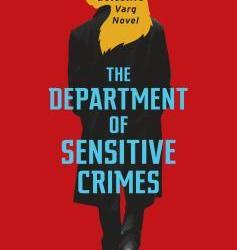

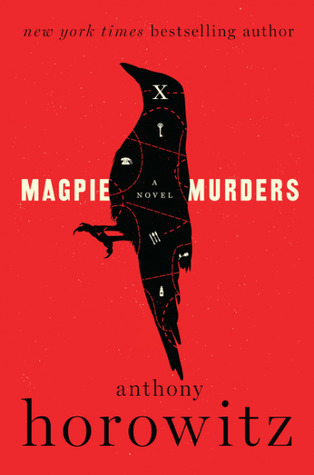

Book Recommendations: For Fans of… Knives Out
Did you enjoy the newest Knives Out mystery, Glass Onion? Here are some read-alikes you may enjoy!
Secrets of the Nile by Tasha Alexander
Lord Bertram Deeley, a renowned amateur British collector of antiquities is entertaining his closest friends at a lavish cruise up the Nile to his home at Luxor when he suddenly collapses after offering a welcome toast, a victim of the lethal poison cyanide. Who amongst this group of his nearest and dearest would want to kill their generous host: an archeologist whose dig Deeley was funding until he suddenly withdrew support? A powerful politician whose career Deeley had secretly destroyed? A dyspeptic aristocratic English spinster whose hired travelling companion seems determined to protect her employer? Or even the formidable Mrs. Hargreaves, Lady Emily’s mother-in-law, who may have spurned the advances of Lord Deeley when they were both younger? A key clue may lie with several ancient ushabtis, exquisite three-thousand-year-old sculptures that played a role in yet another murder in Ancient Egypt, a crime with a very real link to Lord Deeley’s death. Lady Emily and Colin gather their suspects together to reveal the identity of a killer whose motive is as shocking as it is brilliant.
This is the 16th volume in the “Lady Emily Ashton Mysteries” series.
The Department of Sensitive Crimes by Alexander McCall Smith
In the Swedish criminal justice system, certain cases are considered especially strange and difficult - the dedicated detectives who investigate these crimes are members of an elite squad known as the Sensitive Crimes Division. These are their stories.
The first case: the small matter of a man stabbed in the back of the knee. Who would perpetrate such a crime and why? Next: a young woman's imaginary boyfriend goes missing. But how on earth do you search for someone who doesn't exist? And in the final investigation: eerie secrets that are revealed under a full moon may not seem so supernatural in the light of day. No case is too unusual, too complicated, or too, well insignificant for this squad to solve.
The team: Ulf “the Wolf” Varg, the top dog, thoughtful and diligent; Anna Bengsdotter, who's in love with Varg's car (and possibly Varg too); Carl Holgersson, who likes nothing more than filling out paperwork; and Erik Nykvist, who is deeply committed to fly fishing.
This is the first volume in the “Detective Varg” series.
The Murder of Mr. Wickham by Claudia Gray
The happily married Mr. Knightley and Emma are throwing a house party, bringing together distant relatives and new acquaintances - characters beloved by Jane Austen fans. Definitely not invited is Mr. Wickham, whose latest financial scheme has netted him an even broader array of enemies. As tempers flare and secrets are revealed, it’s clear that everyone would be happier if Mr. Wickham got his comeuppance. Yet they’re all shocked when Wickham turns up murdered - except, of course, for the killer hidden in their midst.
Nearly everyone at the house party is a suspect, so it falls to the party’s two youngest guests to solve the mystery: Juliet Tilney, the smart and resourceful daughter of Catherine and Henry, eager for adventure beyond Northanger Abbey; and Jonathan Darcy, the Darcys’ eldest son, whose adherence to propriety makes his father seem almost relaxed. The unlikely pair must put aside their own poor first impressions and uncover the guilty party - before an innocent person is sentenced to hang.
Magpie Murders by Anthony Horowitz
Alan Conway is a bestselling crime writer. His editor, Susan Ryeland, has worked with him for years, and she's intimately familiar with his detective, Atticus Pünd, who solves mysteries disturbing sleepy English villages. Alan's traditional formula pays homage to queens of classic British crime such as Agatha Christie and Dorothy Sayers. It's proved hugely successful. So successful that Susan must continue to put up with his troubling behavior if she wants to keep her job.
When Susan receives Alan's latest manuscript, in which Atticus Pünd investigates a murder at Pye Hall, an English manor house, she has no reason to think it will be any different from the others. There will be dead bodies, a cast of intriguing suspects, and plenty of red herrings and clues. But the more Susan reads, the more she’s realizes that there's another story hidden in the pages of the manuscript - one of ambition, jealousy, and greed - and that soon it will lead to murder.
This is the first volume in the “Susan Ryeland” series.
The Hunting Party by Lucy Foley
During the languid days of the Christmas break, a group of thirtysomething friends from Oxford meet to welcome in the New Year together, a tradition they began as students ten years ago. For this vacation, they’ve chosen an idyllic and isolated estate in the Scottish Highlands - the perfect place to get away and unwind by themselves. They arrive on December 30th, just before a historic blizzard seals the lodge off from the outside world.
Two days later, on New Year’s Day, one of them is dead.
The trip began innocently enough: admiring the stunning if foreboding scenery, champagne in front of a crackling fire, and reminiscences about the past. But after a decade, the weight of secret resentments has grown too heavy for the group’s tenuous nostalgia to bear. Amid the boisterous revelry of New Year’s Eve, the cord holding them together snaps. Now one of them is dead... and another of them did it. Keep your friends close, the old adage goes. But just how close is too close?
#mysteries#murder mystery#fiction#knives out#readalikes#book recommendations#book recs#reading recommendations#reading recs#library books#to read#TBR pile#tbr#booklr#book tumblr#book blog
75 notes
·
View notes
Text
EU ministers have urged member states to do more to screen migrants and expel those regarded as a security risk, amid rising concerns over militant attacks.
Interior and justice ministers were meeting days after a teacher in France and two Swedish nationals in Brussels were murdered by suspected Islamists.
Police across Europe are on high alert in the wake of the Israel-Hamas war.
In France, President Emmanuel Macron has attended the funeral of the teacher fatally stabbed at a school last week.
The service for Dominique Bernard, who was 57, took place in the northern city of Arras. Mr Macron met the family beforehand.
The literature teacher and father of three has been posthumously awarded the Legion of Honour, France's highest civilian decoration.
Dominique Bernard was among several staff who tried to tackle the attacker. Another teacher and a security guard were seriously wounded.
"He was sensitive and quiet. He did not like the sound and fury of the world," Bernard's wife Isabelle, who is also a teacher, told mourners.
The service was broadcast on a screen in Arras's Place des Héros (Heroes' Square).
The suspect, named as 20-year-old Mohamed Mogouchkov, is a Russian national of Chechen origin. He shouted "Allahu Akbar", or "God is greatest", during last Friday's attack, eyewitnesses said.
He has been arrested and faces murder and terror charges.
Mohamed Mogouchkov was known to security services. As a former pupil at the school, he had alarmed teachers with his extremist language, reports said.
Police have also arrested several members of his family, including a brother aged 17, his mother, a sister and an uncle.
As European Union ministers met in Luxembourg on Thursday, EU migration commissioner Ylva Johansson told reporters: "It's important that those individuals that could cause a security threat to our citizens be returned forcefully, immediately."
She added: "We need to be more efficient, close the loopholes and be quicker on decisions to carry out returns."
French Interior Minister Gérald Darmanin said there was "still a bit naivety either in the institutions of some countries, or in the EU".
Monday's attack in Brussels also highlighted problems with the EU's migration and asylum systems.
The Tunisian gunman, identified as Abdesalem Lassoued, shot dead two Swedish football fans on the evening of a Euro 2024 qualifier, before being killed by police the following morning.
Belgian authorities revealed on Thursday that the 45-year-old had tried and failed to get asylum in four European countries - Norway, Sweden, Italy and Belgium. Sweden's migration agency had earlier said he had served a prison sentence there between 2012 and 2014.
He had stayed in Belgium illegally after a bid for asylum was rejected in 2020.
A plan to make it mandatory for EU states to try to return people staying illegally has been stalled for years.
The war between Israel and Islamist militant group Hamas has led to fears of further violence from militants on the continent.
Italy is imposing controls on its border with Slovenia for 10 days because of concerns over national security and irregular migration. Slovenia will follow suit on its borders with Croatia and Hungary from Saturday.
Several other EU member states, including Austria, the Czech Republic and Poland, have already imposed checks in a bid to counter people-smuggling.
8 notes
·
View notes
Note
I don’t think August will have any kind of legal repercussions unless the drugs do come out and/or he gets officially accused for the video and it becomes a Wilmon vs August situation. I do think though we might get social justice and honestly that’s the biggest punishment for August since his status is all he cares about and needs in order to succeed in life. If they take that away from him he is done (which is also why I could maybe see his mental health getting even worse).
That being said, 6 episodes (even if one of them might reach a one hour length) aren’t enough and I’m scared the multiple storylines will be rushed and some things not even properly addressed…
Hi anon! Sorry it's taken me a couple of days to reply.
I'm a little confused about the first part, as the drugs and the video are the only things August has even done that could lead to legal repercussions. But I'm guessing this ask is more of a general response to my criminal justice post...?
That post was never meant as a prediction of what is likely to happen in S3. It was an attempt to describe how things could potentially turn out if the show did go down the police investigation + charge route. Around the time when I wrote that post, many fans seemed to be hoping for August to get 475 years in prison for making and posting the video, which simply wasn't consistent with legal precedent or the basic tenets of the Swedish justice system. So, I wanted to try and explain the framework.
As for the most likely outcome in the show, I do think 'social justice' (in your words) or perhaps even 'poetic justice' is a decent prediction! It would be a pretty fitting end to August's arc for him to be locked out of the inner circle he was so eager to gatekeep, and to see his own actions cost him everything when he started out telling Wille that people like them could get away with murder.
That being said, I do think it's a bit of an oversimplification to say that status is all August cares about, as there's a lot more to it than just him being hungry for power and success. I mean, he definitely is, don't get me wrong! But his status is also inextricably linked to his father's memory and legacy, which he cares very much about, and his sense of self-worth, which is very low underneath all the bravado.
In other words, you are spot on that losing his status would be a critical blow. I also agree that we'd have every reason to worry about his mental (and physical!) wellbeing in that scenario - and that's where my opinion probably diverges from the majority of the fandom.
No matter how awful and wrong August's actions were and how much I want to see him held responsible (whether legally or socially), I personally believe in rehabilitation through accountability and effective intervention. Especially in young people whose brain isn't even done maturing yet, but also in adults (as my spouse's work in a relevant field proves to me over and over).
I want to emphasise that I'm not talking about August being forgiven. His victims don't owe him that, nor does he deserve it when he doesn't even fully understand the gravity of his actions or regret the harm he caused to Simon for example. I'm just saying that seeing some consequences is an opportunity for him to get some help. To start dismantling his warped views, building the true self-worth he lacks and the resilience he needs to weather the loss of his status, and somewhere down the line, growing into someone who no longer hurts others and himself the way he's been doing.
I'm aware that we probably won't get to see that growth in the six eps we've got left. I'm just crossing my fingers for some hints in that direction - him looking into therapy, picking up a pitchfork to muck out Rousseau's stall at a decrepit Årnäs, or if he does end up in community service for example, getting started on that.
I am also reasonably prepared for some of his issues to not be addressed, even if I do see that as a huge missed opportunity. But I dread the possibility of the show ending with him in a state where we can expect him to end up like his father, completely alone and unable to cope with the consequences of his own actions. It would partly sully Wilmon's well-deserved justice for me and make for a tragic ending (and as August is quite universally hated in the fandom, I'm not at all sure how that would be received).
#young royals#august horn of årnäs#august horn#young royals analysis#young royals speculation#yr fandom#august anon discourse
28 notes
·
View notes
Text
Power laws, whereby a small number of people tend to be responsible for a huge proportion of any phenomenon, can be found in all human activity, whether it be income, book sales by authors, or number of sexual partners; the most well-known, the Pareto principle, or the 80/20 rule, originally comes from Italian land ownership.
Lawbreaking, too, observes a power law, so that a huge proportion of crime is committed by a very small number of offenders who have an outsized impact on society.
Inquisitive Bird wrote that power laws are ‘observed for arrests, convictions and even self-reported delinquent behavior’. He cited British data which shows that ‘70% of custodial sentences are imposed on those with at least seven previous convictions or cautions, and 50% are imposed on those with at least 15 previous convictions or cautions (Cuthbertson, 2017).
‘But perhaps the most illustrative study is by Falk et al. (2014), who used Swedish nationwide data of all 2.4 million individuals born in 1958–1980 and looked at the distribution of violent crime convictions. In short, they found that 1% of people were accountable for 63% of all violent crime convictions, and 0.12% of people accounted for 20% of violent crime convictions.’
Therefore in Sweden, some ‘70–80% of violent crimes are recidivism after an earlier conviction for a violent crime’, and ‘approximately half of violent crime convictions were committed by people who already had 3 or more violent crime convictions. In other words, if after being convicted of 3 violent crimes people were prevented from further offending, half of violent crime convictions would have been avoided.’
The author notes that, although ‘America has a reputation of a very harsh penal system that is very quick to lock anyone up’, this is not true. In fact one study found that ‘72.8% of federal offenders sentenced had been convicted of a prior offense. The average number of previous convictions was 6.1 among offenders with criminal history.’
Contrary to what received opinion in Britain believes, America is not a particularly punitive country; in fact criminals are often allowed to repeatedly offend until the inevitable tragedy happens.
The post cites analysis by the National Institute for Criminal Justice Reform which finds that ‘Overall, most victims and suspects with prior criminal offenses had been arrested about 11 times for about 13 different offenses by the time of the homicide. This count only refers to adult arrests and juvenile arrests were not included.’
In Washington DC, about 60–70% of all gun violence is carried out by just 500 individuals, and the same Pareto principle applies to shoplifting, the bane of big liberal cities like San Francisco or Vancouver, where 40 offenders were arrested 6,000 times in a year.
According to the New York Times, ‘Nearly a third of all shoplifting arrests in New York City last year involved just 327 people, the police said. Collectively, they were arrested and rearrested more than 6,000 times.’ That third is therefore committed by less than 0.004% of New York’s population.
The same is true of Britain. According to the Daily Telegraph, ‘Prolific thieves are being caught and convicted of stealing up to 50 times before they are jailed by the courts.
‘Violent offenders are escaping jail until they have been convicted of up to 25 common assaults, while some are accruing as many as seven or eight repeat convictions for carrying a knife before they are given a prison sentence. Other criminals are collecting more than 20 drug convictions before being jailed.’
The paper reported that one-tenth of offenders in England and Wales commit half of all crimes, and that ‘10,400 “super-prolific” offenders who had been convicted of more than 50 previous offences each were spared jail over the past three years’. Between 2019 and 2021, 100,000 offenders with more than 16 previous convictions avoided prison.
They also found that for theft, prolific offenders had to rack up 49 previous convictions or cautions before they were jailed, ‘For robbery – theft with force or the threat of violence – it was nine previous such offences’, and for common assault 25 such attacks.
In 2020, one burglar was only jailed after 20 convictions; one knife offender was caught seven times with weapons before going down, and another eight times. ‘Even for sexual assault, the worst offender had been convicted of five previous attacks before being jailed in 2020, and three in 2021.’ How can someone commit five sexual assaults and still not be jailed?
Yet people convicted of multiple crimes will almost certainly have committed many, many more. One study ‘followed 411 South London men from age 8–9 in the early 1960s through their lives’ and found they admitted to ‘committing many hundreds of times more crimes than they were ever caught for.’ On top of this, most burglars also routinely shoplift, and the fact that people who self-report greater numbers of crimes tend to get caught and convicted later in life ‘implies that self reports have some level of validity’.
Unsurprisingly, British criminals released after short sentences of less than 12 months are more likely than not to reoffend within a year, while only 5% of those who endure stretches of 10 years or more do so.
All of this has huge implications for crime policy and suggests that merely relying on higher clear-up rates, and the stronger possibility of detection, are not enough in themselves. [...]
What matters is that persistent wrongdoers are kept away from society.
A friend based in Singapore has on occasion sent pictures of his bike, in a rack on a main road where he leaves it overnight, unlocked. The fact that he does so, and expects to see it in the morning, is almost mind-blowing to me. [...]
But such levels of civilisation are simply impossible when a small minority of criminals are allowed to mingle freely in society. Urban honesty boxes are impossible not because British society is inherently wicked but because a relatively tiny number of people would clear them out. Imprisoning several thousand more persistent wrongdoers, for long stretches, would bring Britain’s crime rates down to similar levels enjoyed in Singapore, where shops can stay open into the small hours without security, and women can walk home late at night listening to music on their earphones.
Until policymakers accept that prolific criminals have to be incapacitated, the rest of us are condemned to a quality of life well below what we should expect.
2 notes
·
View notes
Note
Same anon, jokes aside, it is actually incredibly mindblowing to hear an american not only understand and participate in scandinavian drama, but to side with the majority of us to plot against the swedes. I am half-joking, of course, but generally the Swedish really, genuinely, have it in their culture to HATE Denmark. I'm pretty sure the first few words they string together from birth is "FUCK The Danes".
Danes shit on Swedes as well, of course, but it's never really genuine.
one time the male Finnish coworker went off about Norway or Sweden, I'm not 100% sure which. it was actually kinda funny because of how out of left field it was. whichever it was, he thinks their justice system is lenient to the point of recklessness. the Nordic/Scandinavian drama is alive and it's exactly what I expected it to be.
of course I'm siding against the Swedes.* they're the Parisians of the Nordics and you may quote me on that. in all seriousness though they do have a stereotype for being judgemental as hell, at least toward outsiders. add to that the fact that American-Swedish cultural relations got fucking wrecked by Trump/covid and the result is a lot of mutual (but not actually serious) annoyance.
also the shit on social media I've seen Swedes say about Ukraine has, overwhelmingly, made my fucking blood boil.
#*this is a joke#my actual belief is that Sweden should be allowed to join NATO I guess#like we may as well at this point#and at least we get Finland out of the deal#ask#anon
12 notes
·
View notes
Text
Swedish activist Greta Thunberg has spoken openly about her Asperger’s syndrome and obsessive-compulsive disorder. She is not the only environmental campaigner to speak about being neurodivergent, something Thunberg describes as her “superpower”.
Naturalists Chris Packham and Dara McAnulty have both discussed their autism. Packham has said that it has been “enormously beneficial” to his career. ...
In a recent BBC documentary about his life with autism, Packham said that some of the campaigners he works with “either are [autistic] or they have traits of autism, with an aggravated sense of injustice and a deep-rooted desire to tell the absolute truth”.
This, he said, can be an asset during turbulent times: “Autistic people have an enormous amount to offer in times of crisis – sometimes clear thinking, clear speaking, can be enormously beneficial.” ...
Autistic people often struggle to adhere to or understand social and cultural norms. This can put them at greater risk of social ridicule, or being described as rude or antisocial. Along with this is often an inability to comprehend or respect hierarchy and authority. These traits may also be a strength in activism, where directly criticising and challenging powerful people and political systems can be a daunting prospect.
Many neurodivergent people believe strongly in equality and fairness, and reject systems where people are not all treated equally. ...
Many people on the autism spectrum have heightened levels of empathy and compassion for those who are suffering or in danger. Similarly, many environmentalists have an unshakeable belief and desire to live a good life and believe in equality and fairness. For both of these groups, a strong sense of justice can be a motivator for how they live and behave. ...
Activism can be an antidote to feelings of distress, discomfort and hopelessness. Activism and pro-environmental actions were essential coping techniques for those who cared for the environment and non-human world.
4 notes
·
View notes
Text
Today in Christian History

Today is Tuesday, January 17th, the 17th day of 2023. There are 348 days left in the year.
Today’s Highlight in History:
1377: Pope Gregory XI enters Rome from Avignon, hoping to put down an Italian revolt against him. He will send Robert of Geneva (later antipope Clement VII) with a company of ferocious Breton adventurers to crush the rebellion with atrocities, but it will continue. In about a year, Gregory will die, leaving the situation worse than it was.
1525: Zurich City Council holds a public debate on infant baptism, which reformer Ulrich Zwingli has mandated as a covenantal act, but which Anabaptists such as Conrad Grebel and Felix Manz oppose, saying that baptism symbolizes a believer’s commitment to Christ and therefore must be entered into by adults with understanding.
1562: Edict of St. Germain is issued, allowing Huguenots to preach in France.
1677: Trial of Ludovick Muggleton, a fanatic religious leader who had gathered many followers and annoyed London authorities by claiming to be one of the two witnesses of Revelation 11 and publicly cursing opponents. He will be sentenced to stand in the pillory for three days in three sections of London, to pay a £500 fine (or go to jail), and to have his books publicly burned. The sect of Muggletonians had arisen under his teaching.
1705: Death in Essex, England, of John Ray, a naturalist and theologian. He systematized botanical classification and developed a theology that sought to understand God’s wisdom and power by studying created things. His system for classifying plants seems to have been the first to divide flowering plants into monocots and dicots.
1932: Death in London, England, of Charles Gore, founder of the Community of the Resurrection, an Anglican monastery. He had been an author, a bishop, and an advocate for social justice.
1945: Raoul Wallenberg, a Swedish Lutheran diplomat, is last seen alive by his friends after Soviets take him into custody. His resourcefulness had saved thousands of Hungarian Jews during Nazi occupation. He will be remembered with other Righteous Gentiles in the Episcopal Church calendar on July 16.
1977: The Supreme Court of India (Hindu) rules that the successful work of a Christian evangelist is a threat to the “freedom of conscience” guaranteed to all citizens of India.
#Today in Christian History#January 17#Trial of Ludovick Muggleton#death of Charles Gore#death of John Ray#Edict of St. Germain is issued#Raoul Wallenberg last seen alive
6 notes
·
View notes
Note
for the book asks: 6, 9, and i'd also love to know if you have any recs for books with a dash of linguistics!
hi, thank you!!
6. what books have you read in the last month?
i read meander, spiral, explode: design and pattern in narrative by jane alison, what we see when we read by peter mendelsund, maria, ihm schmeckt's nicht! by jan weiler. while i've technically read all of cain's jawbone (edward powys mathers) i can't really claim to have finished it (yet? :)) (it's the mystery book where you have to figure out what order the pages should all be in). i also started perfume: the story of a murderer by patrick süskind, and am also in the middle of rereading too like the lightning by ada palmer.
9. when do you tend to read most?
on weekends and in the evening before i fall asleep if i'm not too tired
and a couple linguistically interesting books:
ann leckie: ancillary justice
ada palmer: too like the lightning (i'd recommend also reading this blog post to see whether this book might be interesting to you or very much not your cup of tea)
rainbow rowell: carry on (did this very obviously start out as an hp fanfic? yeah. but the 'language as magic' system is very enjoyable!)
renee gladman: event factory -- the job of the main character is literally "linguist-traveller". can you imagine how jealous i am
elaine castillo: america is not the heart
mark dunn: ella minnow pea
brian friel: translations
and a couple more that are still on my to-read list:
china miéville: embassytown, karin tidbeck: amatka (although it seems that the original swedish version is out of print :( ), arkady martine: a memory called empire
#replies#veikonvihannekset#for the lingfic i had already bookmarked most of the articles that had clued me in that something linguistically interesting might be going#on in those books#being able to add (non-review) notes to books you haven't started reading yet is one of the few features that's kept me from fully switchin#from goodreads to thestorygraph. so i've been using both in parallel for the past year 🙃
22 notes
·
View notes